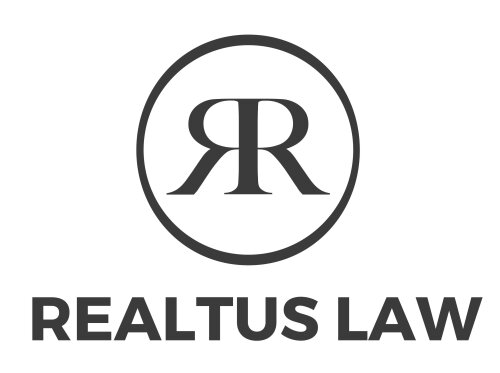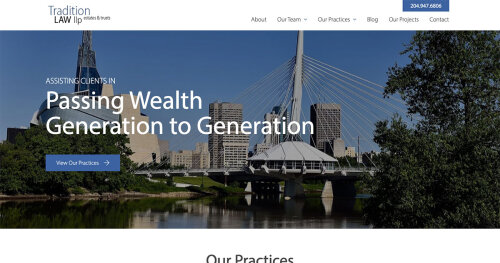Best New Business Formation Lawyers in Canada
Share your needs with us, get contacted by law firms.
Free. Takes 2 min.
Or refine your search by selecting a city:
List of the best lawyers in Canada
About New Business Formation Law in Canada
New business formation law in Canada encompasses a range of legal processes and considerations involved in starting a new business. It covers the registration and structuring of businesses, adherence to federal and provincial regulations, taxation, intellectual property, and employment law. Choosing the right business structure-such as sole proprietorship, partnership, corporation, or cooperative-can significantly influence the legal landscape of the business. Each structure comes with its own set of legal obligations and benefits.
Why You May Need a Lawyer
While starting a new business can be an exciting venture, it involves navigating complex legal landscapes. Here are common situations where seeking legal advice might be beneficial:
- Business Structure Consultation: Understanding the implications of different legal structures on taxation, liability, and governance.
- Compliance: Ensuring your business adheres to federal, provincial, and municipal regulations specific to your industry.
- Contract Drafting: Creating contracts with suppliers, employees, and customers to protect your business interests.
- Intellectual Property: Protecting trademarks, patents, copyrights, and ensuring your business does not infringe on existing IP rights.
- Understanding Tax Obligations: Setting up systems to comply with tax regulations and potentially capitalize on tax incentives.
- Regulatory Approvals and Licensing: Navigating the licensing requirements and obtaining necessary permits.
Local Laws Overview
When forming a business in Canada, you must comply with several legal regulations, which may vary by province:
- Business Registration: Depending on the structure and province, businesses may need to register with federal or provincial authorities and comply with specific naming regulations.
- Federal Incorporation: Offers recognition across Canada, allowing businesses to operate in multiple provinces with a single registration.
- Provincial Incorporation: Requires registration in each province where the business will operate, suitable for businesses with operations confined to one province.
- Zoning and Local Regulations: Compliance with local zoning laws and obtaining appropriate permits is crucial.
- Employment Law: Adhere to labor laws regarding wages, workplace safety, and employment standards.
Frequently Asked Questions
1. What is the difference between federal and provincial incorporation?
Federal incorporation allows your business to operate across Canada with a single registration, while provincial incorporation requires you to register your business separately in each province you operate.
2. How do I choose the right business structure?
Factors such as the desired level of control, liability, tax implications, and future goals should guide your choice. Consulting a lawyer is recommended for personalized advice.
3. Do I need a business license for my new company?
Most businesses require some form of licensing. The specific requirement depends on your business type and location. Check municipal, provincial, and federal regulations.
4. How can I protect my business name?
Registering your business name through a formal process ensures no one else in your jurisdiction uses it. Trademark registration can offer broader protection.
5. What are the tax obligations for new businesses?
New businesses may need to register for GST/HST, file regular tax returns, and maintain specific accounting records. Engaging with a tax professional is advisable.
6. What are the financial record-keeping requirements?
Businesses must maintain accurate financial records, including income, expenses, and employee payroll, for auditing and compliance purposes.
7. Can I operate my business from home?
Depending on zoning laws in your area, you may be able to run a home-based business. Check local regulations to ensure compliance.
8. How do I hire employees legally?
Comply with employment standards legislation, including minimum wage laws, occupational health and safety regulations, and pay-related requirements.
9. What should I include in contracts with partners or vendors?
Key elements like payment terms, responsibilities, confidentiality, conflict resolution terms, and termination conditions should be clear and legally binding.
10. Do I need insurance for my business?
Insurance needs vary, but common types include liability insurance, property insurance, and employee insurance. Assess risks to determine appropriate coverage.
Additional Resources
For further information on new business formation in Canada, consider the following resources:
- Government of Canada's Business Network: Offering information on starting and growing a business.
- Canada Revenue Agency: Provides guidance on tax obligations and registrations.
- Industry Canada: Information on industry-specific regulations and support.
- Provincial Business Service Centers: Provincial requirements and support programs.
Next Steps
If you need legal assistance for your new business formation, consider the following steps:
- Identify Your Needs: Determine the legal aspects you need help with, such as incorporation, intellectual property, or contracts.
- Research Legal Professionals: Look for lawyers or firms specializing in business law with a strong track record in new business formation.
- Consultation: Schedule consultations to discuss your specific needs, ask questions, and evaluate their understanding and approach.
- Finalize Engagement: Choose a legal professional who you feel comfortable with and trust to represent your interests effectively.
Lawzana helps you find the best lawyers and law firms in Canada through a curated and pre-screened list of qualified legal professionals. Our platform offers rankings and detailed profiles of attorneys and law firms, allowing you to compare based on practice areas, including New Business Formation, experience, and client feedback.
Each profile includes a description of the firm's areas of practice, client reviews, team members and partners, year of establishment, spoken languages, office locations, contact information, social media presence, and any published articles or resources. Most firms on our platform speak English and are experienced in both local and international legal matters.
Get a quote from top-rated law firms in Canada — quickly, securely, and without unnecessary hassle.
Disclaimer:
The information provided on this page is for general informational purposes only and does not constitute legal advice. While we strive to ensure the accuracy and relevance of the content, legal information may change over time, and interpretations of the law can vary. You should always consult with a qualified legal professional for advice specific to your situation.
We disclaim all liability for actions taken or not taken based on the content of this page. If you believe any information is incorrect or outdated, please contact us, and we will review and update it where appropriate.
Browse new business formation law firms by city in Canada
Refine your search by selecting a city.














